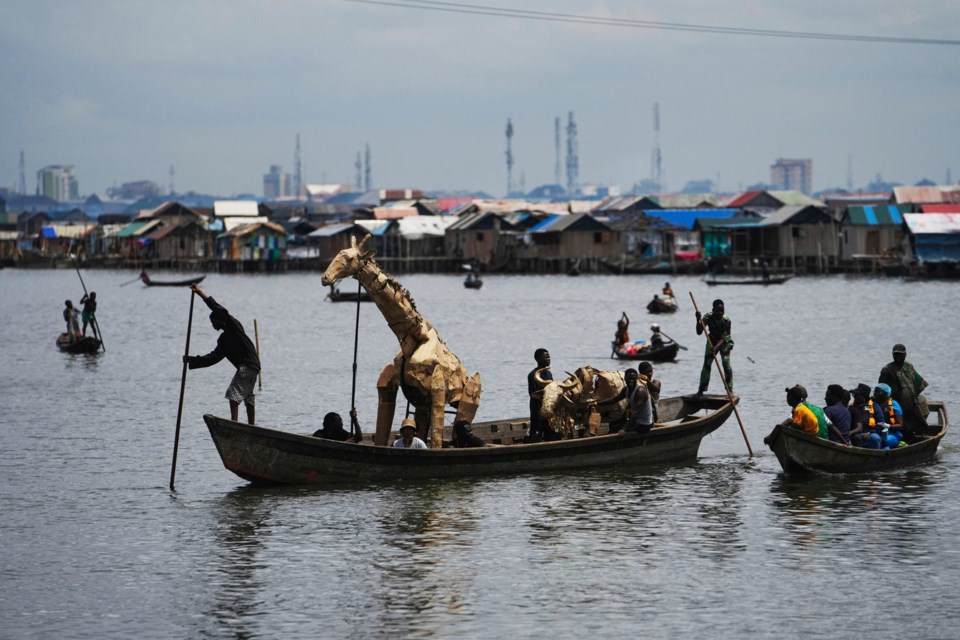MAKOKO, Nigeria (AP) — Several canoes paddle toward Makoko, a vast floating slum built on stilts in the lagoon at one end of Nigeria’s economic hub of Lagos. Riding on the vessels are giant cardboard puppet animals along with their puppeteers dressed in black.
Once on the water, the animals — a gorilla, a leopard, an elephant, a wildebeest, a giraff and a donkey — all come alive. The gorilla hoots, the donkey brays and wags its tail as the leopard bends its neck toward the surface as if to drink but halts just before its face meets the water and then turns to look around.
It is Saturday, the second day of “ The Herds” theatrical tour stop in Nigeria on a journey 20,000 kilometers (12,427 miles) from Africa's Congo Basin to the Arctic Circle with puppet animals. It's a journey organizers say is meant to bring attention to the climate crisis and “renew our bond with the natural world.”
The tour started last week in Kinshasa, the capital of Congo, and will continue across the world with Dakar, the Senegalese capital, as the next stop.
The story goes that the animals will be forced out of their natural habitats due to global warming and displaced north, stopping in cities along the way and being joined by more animals.
The sprawling slum of Makoko — an old fishing village — was perfect to illustrate that because it has for many years shown resilience in the face of climate change, often finding ways to adapt to extreme weather, said Amir Nizar Zuabi, “The Herds” artistic director.
Dubbed the Venice of Africa, the Makoko slum is a low-lying community vulnerable to rising sea levels and flooding. Lagos itself is no stranger to the impacts of climate change, with roads and houses across the coastal city often engulfed during annual flooding.
“We are on the edge of one of the greatest global crises, and ... I think the global south offers a lot of knowledge and a lot of resilience,” Zuabi said, referring to developing countries in the Southern Hemisphere with lower incomes and higher poverty rates compared to the “global north.”
Spread out beneath the Third Mainland Bridge that connects much of Lagos, Makoko came alive as “The Herds” moved in. People poked their heads out of windows in awe of the exhibition. Children and women stood on the plank porches outside their rickety wood houses, watching as the animals paddled in through the narrow waterways. Some mimicked the animals while others applauded and waved at them.
“It looked so real,” Samuel Shemede, a 22-year-old resident of Makoko, said in awe of the puppets. “I had never seen something like that before in my life. It is not real, but they made it look so real.”
As the tour left Makoko and moved to the Yaba suburb, the city's notorious traffic stood still for the puppets as they towered over people and vehicles. The big animals had been joined by smaller primates like monkeys who hoot noisily, prance around, and even dance.
The tour was punctuated by dance and choreography performances from a local theater group whose performers, clothed in beige sack material and straw hats, intermittently charged toward the puppets as though they were about to attack them.
As they journeyed through the streets, spectators were treated to chants from the Hausa language song "Amfara," which loosely translates to “We have started.”
At a time when African nations are losing up to 5% of their gross domestic product every year as they bear a heavier burden than the rest of the world from climate change, “The Herds” organizers said it is important to break down climate change and its impacts in a way that many people can relate to.
“A lot of climate debate is about science … and scientific words don’t mean anything for most people,” Zuabi, the artistic director, said. “I wanted to create a piece of art that talks about nature, beauty and how animals are wild and majestic."
The animals invading cities is a metaphor for abnormal things now becoming normal as the world deals with climate change, he said. “And hopefully this becomes a way to talk about what we are going to lose if we continue burning fossil fuels.”
Pelumi Salako, The Associated Press




